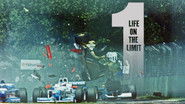andyhise
After cramming a dozen of the most hoary, hackneyed clichés into its first sixty seconds, I thought uh-oh, here we go. After F1 received the Fisher Price treatment in RUSH, a film which did the sport no real justice at all, it's amateur hour again. Stand by for a 90- minute Sky Sports style montage: fast cars, girls, loud noises, blah blah.. All fast edits, flash camera-work, no authenticity, no substance.But I was wrong. After the pomp and circumstance of the first minute, '1' slams to a halt, literally, as Martin Brundle's car rises and violently jackknifes through the air and into the Armco at Adelaide '96. Silence .. Surely he's got to be dead. But F1 fans know he's not. In a perfect scene-setting moment, Brundle's familiar voice cuts through the air, tells us he shouldn't be alive today, and we have our context. And then we're launched back in time, into what turns out to be a journey through F1's horrific middle years, and how a passionate group of drivers and team owners struggled to reduce the death count in a sport which had all-too-often become - at its grisly height in the Seventies - the sporting equivalent of a snuff movie. Motorsport fans love a good crash, but when a driver is burnt to death, or virtually sliced in half, or decapitated - all of which happen in '1'- it ceases to be entertaining. The film teaches you how Stewart, Fittipaldi and Lauda played their roles in making the sport safer, and how Bernie Ecclestone of all people perhaps made, with his insistence that Prof Sid Watkins (may he rest in peace) rule every race from a medical standpoint, the biggest contribution. Max Moseley, too. I hadn't appreciated all of this.Nor did I know that Rindt died when he insisted on removing his own rear wing to make the car go faster. Or how much of a superstar Cevert had become before that stomach-churning crash at Watkins Glen which made his fellow drivers cry with the horror. Or indeed many other things, and I am a life-long fan of F1 since 1977, the year of Tom Pryce and Kyalami, although that insane, terrible and unforgettable moment isn't featured in the film.'1' is wonderful. At times, if you're a hardcore, long-time fan, especially if you experienced the sport through the driver-killing Seventies like my brother Mark and I did, it might put a few tears in your eyes.It gets compared to SENNA, which is a seminal documentary in any genre, never mind sports documentaries. But I'm not comparing the two. '1' has its place, and in my view it joins SENNA as the second great F1 film in recent years.It doesn't go for controversy, although there is naturally some finger-pointing. If you're a circuit-owner from the 1970s, or a relative of Colin Chapman, you might not like what you see here. Jacky Ickx, too, is singled out as a reckless Neanderthal who ignored safety and went against the rest - although Ickx magnificently defends his case in a relaxed, rather charming interview, without appearing too self-satisfied.In fact, Ickx's charismatic and likable turn is suffused with the glow of a man who walked the tightrope blindfold, and didn't fall. The predominant vibe from the interviewees who were around when the others were dying so often ... Fittipaldi, Andretti, Ickx, Stewart, Surtees, and of course Lauda ... is that they are The Survivors. As Andretti says, he dodged the bullet.That the bullets found so many of the greatest drivers who ever lived, is what gives '1' it's constant air of tragedy.There is dread when a driver, such as Clark, Cevert or Rindt, receives the in-depth treatment, in the knowledge that the film makers are simply giving us the measure of men who, ultimately, would die horribly at the wheel of their car.Some may find '1' ghoulish. I found it a fitting memorial to men both living and dead who are among my sporting heroes of all time.A world-class line-up of interviewees, more or less everybody you'd want to hear from (except, perhaps, Prost), filmed and edited tastefully. Nobody outstays their welcome. It's a brisk film punctuated by invigorating music and the ear-shattering, primal noises of an F1 circuit. And yes, it sounds amazing on your home cinema.The men who play their parts in the relative sanitisation of the modern-day sport are reduced to a few interviews early and late in the movie, but although that very sanitisation is clearly where '1' is headed, it also knows that that's not where the story or the entertainment truly lie.Kudos to the film makers for not producing an F1 retrospective for the YouTube generation.But, briefly, you're brought to the near-present day by a genius quip from the quick-witted Robert Kubica, near the end. Cue much laughter.It's a film for me and my big brother, as we were there back in the day. Monza 1977, the year before Sid Watkins arrived, and Petersen died, we sat in that big long old stand among the Tifosi, and watched Andretti beat the six-wheel Tyrrells. We - like a million other men of a certain age - remember those days, obsessively following a dangerous sport in which anything could happen, and which has now become relatively predictable, sanitised and desperately, almost calamitously, commercial.Maybe death is entertainment, after all. Perhaps that's what we all have to recognise. The Romans had their gladiators, and we had ours. But the Formula One gladiators who died, all died doing something they loved - right up to the moment of impact, the sport to which they had devoted their lives quickly and brutally sending them on their journey into the next one.
Scaramanga
Coming in the wake of Senna and Rush, F1 has been spoiled in recent years. Despite production starting before either of the former films, 1: Life on the Limit is the last to be released, and suffers a little because of it.I had the privilege of seeing this film screened at Silverstone during the British Grand Prix weekend, and what an arena to see it in, surrounded by Formula One Fans of all ages!The film tells the history of Formula One, from its beginnings right up to the 2012 season, (Sebastian Vettel is credited as "3 time world champion"). Bookended by Martin Brundle's horror crash at the Australian Grand Prix in 1996 where he ran back to the pits and simply got in the spare car to take the restart, the documentary struggles to find the story it is trying to tell. Is it the evolution of safety, or a straight documentary about the history of Formula One?As a story about the strides made in safety, the story seems to finish with Brundle's crash highlighting that it was just 2 years after the death of Ayrton Senna, but then goes on for a while after that, leading more towards it being aimed as a story about the history of F1.As a history of F1, it doesn't offer much more than a long-time follower of F1 wouldn't know, but does offer little morsels that may be unfamiliar to some people, such as how Bernie Ecclestone became one of the most influential people in world sports, or Jacky Ickx, the driver who rebelled against the drivers union when they attempted to strike over safety concerns.But with 64 years of history to cover, the documentary does not really have the time to go into much depth over the stories and personalities involved, and comes across as a little shallow as a result.Having said that, I would recommend this film to anyone with a passing interest in F1 as a springboard to other stories within F1 and adding context to the names of legends that are still revered by F1 drivers and fans alike, especially after seeing Rush, but possibly before seeing Senna as the Senna section of this film does leave you feeling a little short-changed.


